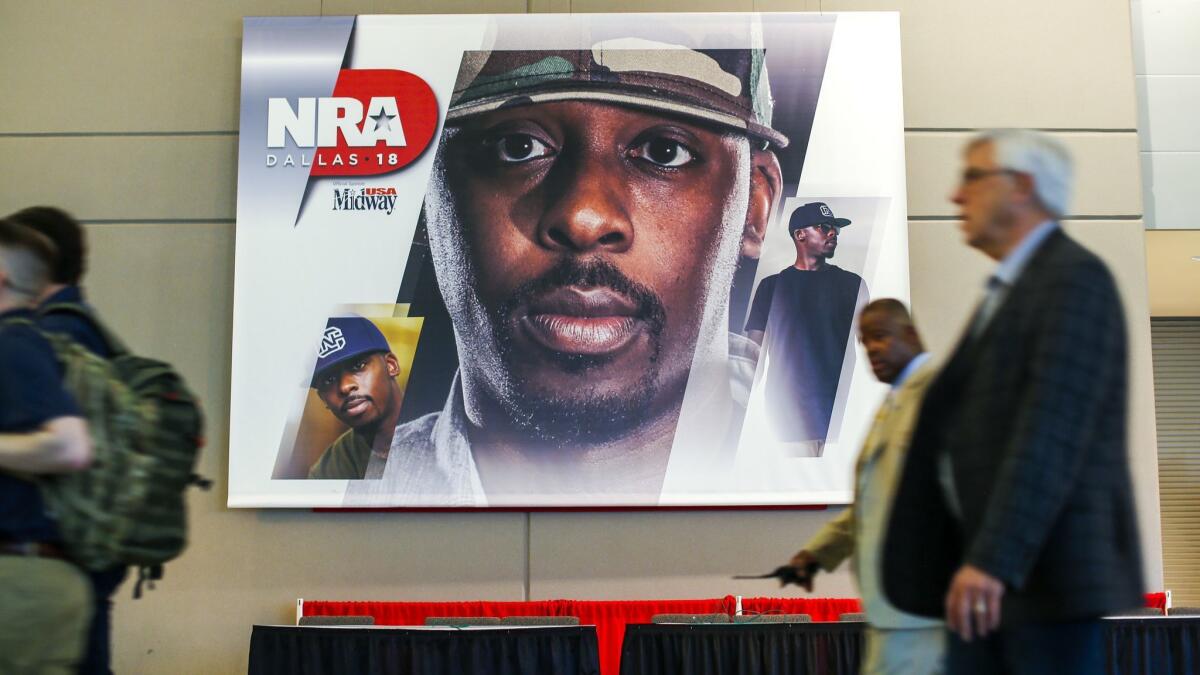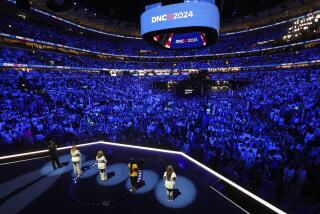NRATV’s Colion Noir on black gun ownership, the Parkland students and why he finds the AR-15 ‘beautiful’
- Share via
Reporting from Dallas — With President Trump scheduled to speak at the National Rifle Assn. convention in Dallas on Friday, The Times sat down with Collins Idehen, a.k.a. Colion Noir, a 34-year-old NRATV host and lawyer whose controversial videos about guns, race and current events have earned him some 690,000 followers on YouTube.
As a black NRA member, Noir takes issue with those who view him as a token, citing a history of black gun ownership dating back to the formation of the Buffalo Soldiers from a U.S. Army regiment in 1866. It had been five years since his last interview with the newspaper, and he had plenty to say about Trump, the role of the AR-15 rifle in mass shootings and the rise of a youth movement for gun control following the February massacre of 17 students and staff at Marjory Stoneman Douglas High School in Parkland, Fla.
How have things changed in the last five years?
I’m starting to branch out of the gun space. I just did the interview with Killer Mike [rapper and activist Michael Render] and the podcast with [comedian] Joe Rogan. Unfortunately the Parkland shooting has created the fervor where everyone wants to talk about this issue.
The Killer Mike interview caused a lot of controversy. Can you explain what you said about Parkland?
I’ve always been of the mindset that the conversation about firearms should not be divided along political affiliations. You can be a liberal and still be a gun owner, you can be a conservative and be a gun owner, you can be a libertarian and be a gun owner, you can be a Green Party member and be a gun owner. The gun transcends political party lines, in my mind. However, we’ve allowed the conversation about guns to be divided along political lines. So I thought what better way to start destroying those walls than to have someone like Killer Mike, who I don’t necessarily agree with on [supporting] Bernie Sanders. But we agree on this issue. There’s been this perception that black people are monolithic when it comes to gun ownership, and that’s just not true.
So what happened?
We had that conversation, and part of that dealt with Parkland. It created an uproar under the guise of, “How dare you criticize these kids for marching to save their lives.”
Were you criticizing the Parkland students?
I wasn’t criticizing them. I wasn’t criticizing their march. I was criticizing the policies they were pushing. I will fight for their right to march. I have no problem with them using the 1st Amendment right to march. What I didn’t like was the hypocrisy and the way they were utilizing this march to not only advocate against the 2nd Amendment but also using it as a way to stifle the voices of the people who do agree with the 2nd Amendment by getting Amazon or Apple to bar us from having a platform on their platform. I thought that was incredibly disingenuous. You can’t say in one breath, “I’m using my 1st Amendment right to express my ideas,” but then also [use] your 1st Amendment right to prevent me from using my 1st Amendment right to express my ideas that so happen to disagree with yours. That wasn’t fair. What was happening, they were utilizing these kids in such a way that they were beyond reproach.
When you say “they,” you mean …
The gun control lobby. They were trying to get Amazon to boycott us, NRATV.

Why do you think the Parkland students got so much attention?
Because the kids were so vocal. I don’t think we’ve had a group of kids that were as vocal after a mass shooting as these kids were. And then you couple that with the social media component, which is bigger than it’s ever been before and allowed them to spread their message far and wide. Which I think they did a brilliant job of. I just disagree. I said, “I wish nobody knew your names, because then that would mean none of your friends died, and that there was someone to either stop it or prevent it.” The way the media cut it was, “I wish no one ever knew your names.”
And you went on to talk about a school security officer who stopped a school shooting in Maryland — so that’s what you meant?
Yes, that I wish there was a “good guy with a gun” there to stop it. I put out my own video clarifying what I said.
Trump is coming to the convention Friday. Did you vote for him?
Yes. It was Hillary [Clinton] or Trump, and we had a Supreme Court seat that was up for grabs, and the court was split. And the court has an incredible ability to shift what the 2nd Amendment is.
How has Trump done?
Some good and some bad. His rhetoric is, bar none, entertaining. Some of it is necessary; some of it I don’t think is.
What do you think about how Trump has handled white nationalists?
I don’t believe he’s a white nationalist. I don’t. Do I think he’s ignorant to some aspects of race? Absolutely. Think about it: He’s a billionaire, he’s white, he’s by and large lived on the East Coast. He’s not going to have an incredibly informed understanding of the idiosyncrasies of the black community. What I don’t get is an undertone of inherent vitriol or hatred or racism from him. Certain levels of ignorance or misunderstanding, absolutely. I don’t regret my vote because I know what the alternative was.
What do you think of Trump’s decision to come to the convention?
It demonstrates how important the 2nd Amendment is and how important the NRA is in this country.
Guns won’t be allowed into Trump’s keynote speech, and protesters are expected outside. Are you concerned about safety?
I don’t feel any less safe than I do walking around any other day. It’s not like they’re saying no guns at all. If you’re at that venue, you’re going to be protected by people with guns. It’s like what we said should happen after Parkland. They’re not only saying you can’t bring your gun; they’re saying we’re going to search people and have armed guards. Whereas at a school, it’s just a sign in the window saying “Gun-free zone.” I don’t think a mass shooter’s going to see that sign and turn around.
What would you say to those who see the NRA as racist?
Do you know how many black people have said to me, “I started shooting because of you and what you do with the NRA?” That seems counterproductive for an organization that doesn’t want black people to own guns.
Since we last talked, Texas — like some other states — made it legal to openly carry handguns. Do you?
I do not “open carry.” That is based on a tactical decision. I don’t have a problem with it. I prefer [the sight of my gun] to be a surprise. Some people prefer it to be a deterrent.
What’s up with the picture of a gun on your T-shirt?
It’s actually a shirt I sell. It’s called “AR-15: The beauty is in the lines.” I consider the AR-15 platform to be visually, aesthetically beautiful.
What do you mean?
I just love the way the platform looks.
Meaning the design of the weapon?
Yeah. I’m one of those people who that tends to find aesthetic value in mechanical things, whether it be a car or a gun.
How are you feeling about the AR-15?
Largely my feelings about the AR-15 have not changed. I’ve seen a re-vilification of it as of late. It’s become public enemy No. 1, which is a bit odd to me.
What would you say to people who after Parkland or other mass shootings blame the AR-15 or say if we don’t have these weapons, if we don’t have bump stocks, we won’t have as many fatalities?
That it’s not true. It’s hard to disconnect the emotional aspect of witnessing carnage like that from the actual carnage. To think that banning a bump stock or an AR-15 would have prevented that, it’s just not true. Not just in theory, but in reality. One of the most deadly mass shootings we had was Virginia Tech. He used an handgun. He didn’t use an AR-15. We’re focusing on the tool used instead of the underlying reason for why this is happening.
Questions and answers have been edited for length and clarity.
molly.hennessy-fiske@latimes.com
More to Read
Sign up for Essential California
The most important California stories and recommendations in your inbox every morning.
You may occasionally receive promotional content from the Los Angeles Times.














